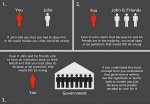On February 12, 2014, the Oklahoma Senate passed the National Popular Vote bill by a 28–18 margin.
The National Popular Vote bill has passed 33 state legislative chambers, in 22 rural, small, medium, and large population states, including one house in the recent battleground states of Michigan (16), Nevada (6), New Mexico (5), North Carolina (15), and both houses in Colorado (9) .
The bill has passed 33 state legislative chambers, in 22 small, medium-small, medium, and large states.
In Gallup polls since 1944, only about 20% of the public has supported the current system of awarding all of a state's electoral votes to the presidential candidate who receives the most votes in each separate state (with about 70% opposed and about 10% undecided).
Support for a national popular vote is strong among Republicans, Democrats, and Independent voters, as well as every demographic group in virtually every state surveyed in recent polls
in recent or past closely divided Battleground states: CO – 68%, FL – 78%, IA --75%, MI – 73%, MO – 70%, NH – 69%, NV – 72%, NM– 76%, NC – 74%, OH – 70%, PA – 78%, VA – 74%, and WI – 71%;
in Small states (3 to 5 electoral votes): AK – 70%, DC – 76%, DE – 75%, ID – 77%, ME – 77%, MT – 72%, NE 74%, NH – 69%, NV – 72%, NM – 76%, OK – 81%, RI – 74%, SD – 71%, UT – 70%, VT – 75%, WV – 81%, and WY – 69%;
in Southern and Border states: AR – 80%, KY- 80%, MS – 77%, MO – 70%, NC – 74%, OK – 81%, SC – 71%, TN – 83%, VA – 74%, and WV – 81%; and
in other states polled: AZ – 67%, CA – 70%, CT – 74%, MA – 73%, MN – 75%, NY – 79%, OR – 76%, and WA – 77%.
The National Popular Vote bill says: "Any member state may withdraw from this agreement, except that a withdrawal occurring six months or less before the end of a President’s term shall not become effective until a President or Vice President shall have been qualified to serve the next term."
Any attempt by a state to pull out of the compact in violation of its terms would violate the Impairments Clause of the U.S. Constitution and would be void. Such an attempt would also violate existing federal law. Compliance would be enforced by Federal court action
The National Popular Vote compact is, first of all, a state law. It is a state law that would govern the manner of choosing presidential electors. A Secretary of State may not ignore or override the National Popular Vote law any more than he or she may ignore or override the winner-take-all method that is currently the law in 48 states.
There has never been a court decision allowing a state to withdraw from an interstate compact without following the procedure for withdrawal specified by the compact. Indeed, courts have consistently rebuffed the occasional (sometimes creative) attempts by states to evade their obligations under interstate compacts
An interstate compact is not a mere “handshake” agreement. If a state wants to rely on the goodwill and graciousness of other states to follow certain policies, it can simply enact its own state law and hope that other states decide to act in an identical manner. If a state wants a legally binding and enforceable mechanism by which it agrees to undertake certain specified actions only if other states agree to take other specified actions, it enters into an interstate compact.
Interstate compacts are supported by over two centuries of settled law guaranteeing enforceability. Interstate compacts exist because the states are sovereign. If there were no Compacts Clause in the U.S. Constitution, a state would have no way to enter into a legally binding contract with another state. The Compacts Clause, supported by the Impairments Clause, provides a way for a state to enter into a contract with other states and be assured of the enforceability of the obligations undertaken by its sister states. The enforceability of interstate compacts under the Impairments Clause is precisely the reason why sovereign states enter into interstate compacts. Without the Compacts Clause and the Impairments Clause, any contractual agreement among the states would be, in fact, no more than a handshake.

